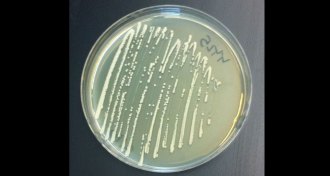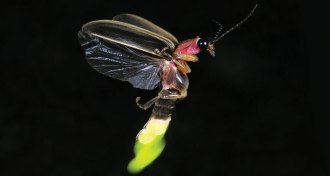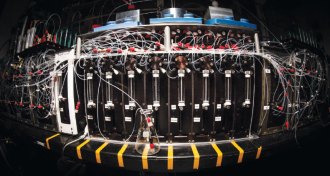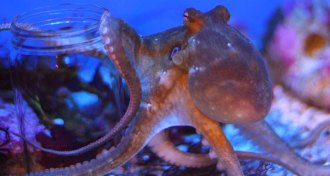All Stories
-
 Chemistry
ChemistryPathway pieced together to make opiates in yeast
Scientists have engineered yeast to make sugar into thebaine, a precursor to opiates such as morphine.
-
 Animals
AnimalsA UFO would stress out a bear
Scientists need to know how animals, such as bears, react to the drones being used increasingly to study them.
-
 Planetary Science
Planetary ScienceComet 67P, Rosetta spacecraft cozy up to the sun
Comet 67P is shooting off brilliant jets of gas and dust as it swings in close to the sun, giving scientists clues to the space rocks chemical composition.
-
 Animals
AnimalsLight pollution may disrupt firefly sex
Females of a common big dipper firefly weren’t as flashy when forced to flirt in LED light pollution.
By Susan Milius -
 Animals
AnimalsCougars may provide a net benefit to humans
Cougars have disappeared from the eastern United States. If they returned, they’d kill deer, preventing many car crashes, scientists find.
-
 Neuroscience
NeuroscienceShifting views of brain cells, and other fresh perspectives
The details emerging from the latest work on glial cells are sure to yield more insights as scientists continue their struggle to understand the mind.
By Eva Emerson -
 Astronomy
AstronomyLucy’s new neighbor, downloading New Horizon’s data and more reader feedback
Readers discuss why Pluto's data will take so long to get to Earth, the role the cerebellum plays in creative thinking and more.
-
 Chemistry
ChemistryAutomated chemistry could build better drugs fast and cheap
Automated molecular synthesis may win over chemists who are not convinced that more technology in drug design is better.
By Beth Mole -
 Health & Medicine
Health & MedicineFootball games come with more head hits than practices do
As football intensifies from practice to games, the number of impacts increases, a new study finds.
-
 Genetics
GeneticsHow an octopus’s cleverness may have evolved
Scientists have sequenced the octopus genome, revealing molecular similarities to mammals.
-
 Particle Physics
Particle PhysicsAntimatter doesn’t differ from charge-mass expectations
An experiment with unprecedented precision finds that protons and antiprotons have the same ratio of charge to mass, which is consistent with theories but disappoints many physicists.
By Andrew Grant -
 Physics
Physics3-D printed device cracks cocktail party problem
A plastic disk does what sophisticated computers cannot: solve the cocktail party problem.
By Andrew Grant